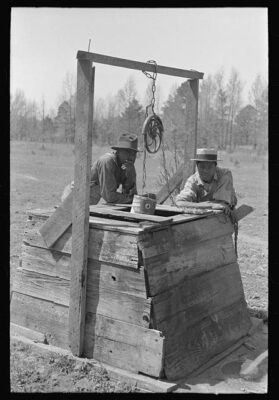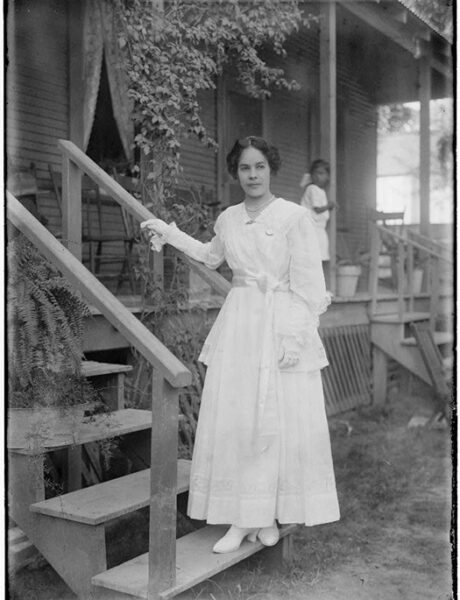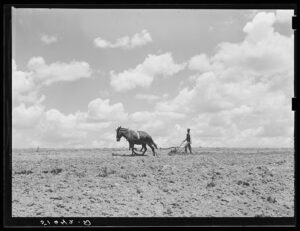Southern Legitimacy Statement: After I listened to Sinatra singing “The Wee Small Hours of the Morning” earlier today and remembering how much I liked it as a kid, I thought about how the song had come into my life. My mother, a Southern eighth-grade educated working class girl, had left High Point, NC with her first alcoholic husband. His name was Protus Ijames, really, and they went to New York City where he had family. She was twenty-two on December 7, 1941 and after that day, they were soon in Norfolk, Virginia working in the Navy Yard. Protus was a highly skilled machinist and they wouldn’t let him enlist. They needed him to build ships and they needed my mother to operate cranes.
While she was working the Navy Yard, her future second-alcoholic husband, my father, was waiting to go to France, where he would be shot in the leg, which led first to pain-pill addiction and then alcoholism.
It was during her year in New York that she fell in love with the smooth music and grew away from the country music she’d been raised on. All her life, she’d tell me about how much she loved Glenn Miller. (I had them play “Moonlight Serenade” at her funeral.) She loved little Frank, too, and, although the white Southern girl in her made her keep it a secret, she loved Ella and Billie and Duke Ellington. So, a couple of decades later, after my father had deserted us and ended up in federal prison, and we lived in the white project and then in an old abestos-sided house in the country, we’d always keep a portable record player and found a way to listen to those songs.
I was a kid who was supposed to reject what she said but the music hooked me and never let go. I slipped easily into Bird and Coltrane and Billie and Dinah and so many others and never looked back. So, I should thank my mom, who wasn’t someone who left many things behind one could be grateful for.
Anyway, that is why I’ve always like Sinatra.
**So, with a Southern Legitimacy Statement like that one, you know why John Riley is one of our favorite poets here at the Mule, right?
Five Truly Incredible Poems
White Lies
White people lie all the time especially white drunks
from the dregs of the Mississippi, where my father
was made of mud and weeds and carried a crooked
dowsing stick he said he trusted to keep him
going in the direction he was supposed to be going
because he was a fool even as a boy and had no idea
which direction was wrong and which was right and even
his lies were too wild to be believed and anyone
who met him knew before he spoke he was lying.
It took him years of practice to control his lies
and make them believable enough to have a sad
woman write him a check or a poor fool buy a Ford.
He told me he learned lying from his father and it was
passed down to his son, me, with my own bottles
of cheap vodka hidden behind the books that I claimed
were my prized possessions but were forgotten
by the second day of a drunk when my lies snapped
out like a cowboy’s whip but this isn’t about me
or the drinking that I ended years ago, or at least
for tonight as I sit here before the computer thinking
of the only picture I ever saw of my father’s mother
who I was told was Choctaw with no smear
of lying white blood in her but she married
my grandfather, another drunk, which mingled her
nature with lies so she may not have even been Choctaw
although in the black and white photo I saw she stands
in the midst of some species of delta foliage with one hand
on a thick stalk and she is looking into the camera
a few feet away with a slight smile over-powered by
a deep-dark stare, her dark hair falling off her shoulders
and down over her breasts in the dull, man’s shirt
she wore and the one time I saw the photo I stared
for minutes into her eyes and knew she was no white liar,
it was clear in those dark eyes, she was a person
of the swamp and wood and river, not the roadways
and bars and I know some things are larger than lies.
She died of the puerperal fever a few days after
my father was born and left her half-white son in the hands
of a white lying father and now that photo is gone
after my lying sister said she had misplaced it
so she wouldn’t be bothered to have copies made
and it is no lie that my sister’s house burned down
last month after she and her man passed out from
pills and drink and now the picture is gone the same
way my grandmother is gone in a moment in a breath
that was welcomed like another door to the truth.
***
Owl
She stared through the narrow window
above the sink in the old farmhouse, looking
across the small plot with the squat granite pillar
used in the last century
for ladies to step onto a horse
and wondered how deep into the earth the stone was stuck
but never thought of the burden on her hips
or the heat that brought it there
or of the silliness of a god
who emerged billions of years too late
or of the beasts that prayed
with the humans when food ran out
or of the children who arrived on the wings of a crow
or on the back of a wolf
or of the childless owl that flew
deeper into the past following
the first dawn’s first fading.
***
The Colonel’s Last Battlefield
Guilford Courthouse National Military Park, September 2021
They bused us, the old folks, to the battlefield,where first we’ll have a picnic by the slate-colored lake.Later, the young nurse will lead us to the water’s edgeto feed the geese and watch the brown and gray ducks
spin with their heads beneath the surface.
All care has been taken to assure our safety,walking paths cleared, attendants standing ready.
Here, six klicks from the old Meeting House,
a Quaker general settled his soul into hellbloodying a British lord’s mercenaries.The bones of the fallen,
now prize possessions
protected by federal law,
are buried where they fell.
Like the memory of my last passion
the venom once here no longer lingers.
Below me, in the soft wet groundwhere my feet dare not shufflethe foliage of post-bloom bulbsdroop beyond their weight.
On the water’s dark surfacethree mallards with silky green headstire of my stare, glide to the other side,trailing six lines of diverging wake.
***
Bog Pond
He knew the things that move the fastest
were the first to die
so waited each night as dark slipped
like the slowest law handed down from
the highest peak,
refused to tremble
as dark oozed
over the horizon, hung there like
an end of him—
a boy who searched each day for nothing
and was sure to never find it
under the sun or under the moon
where he learned to keep himself calm
by sharpening flint heads
on a fist-sized granite
he wouldn’t trade
for a god or a gun.
Long after the sun left
the wind blew down low
before rising to lull over the thick black settle
lying heavy across the bog pond
to lure the agile groundhogs and woodchucks
down the dank hill to where the creek
gave up the ghost.
He watched the animals run to the dark water
and bound from the bank and sink
out of sight in the bog turned black
by all the nights that came to it
from all over
and fell down dead.
***
Fighting Men at the Liquor House (1967)
At the free meal, they dipped
store-bought bread into gravy,
pushed small pieces of floured beef
around a shallow, flowered bowl,
each man pressing his lips tight
as though challenging the others to speak
for what was there to talk about,
their war was long over, the big war before
the last big one, when tanks had chain-belt wheels
and gas masks hung from their belts.
The war they never understood
because it was only the fools
who thought they knew why
they were over there—these
once strong men now old,
their mason jars tagged with tape labels,
the names written on them unintelligible.
I remember them, sitting here now
in the pre-dawn morning, concerning
myself with words but most anxious
to not lose sight of the nights when
the old men never made it to their beds
and became old soldiers faded out,
their heads hanging at angles from tall cane chairs
and me, awake, raiding their stupor
until the sun returned and they woke
at dawn, under the still burning electric light
so unlike the starlight in France.







